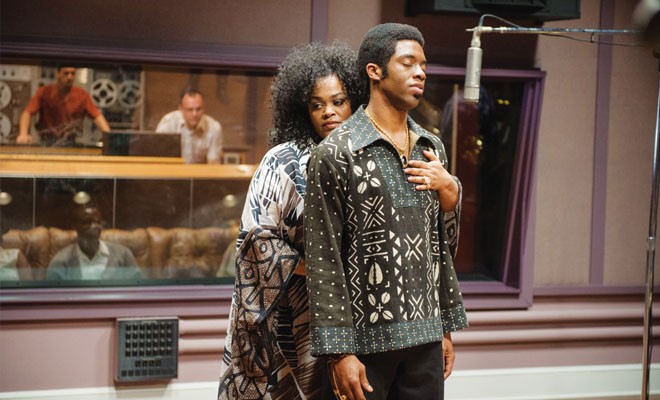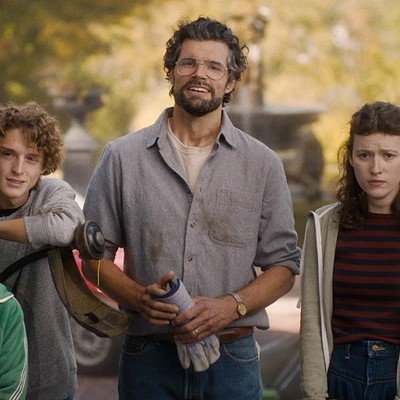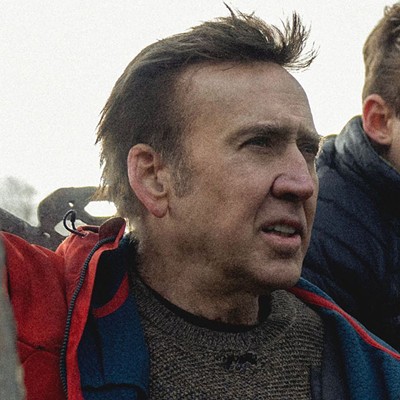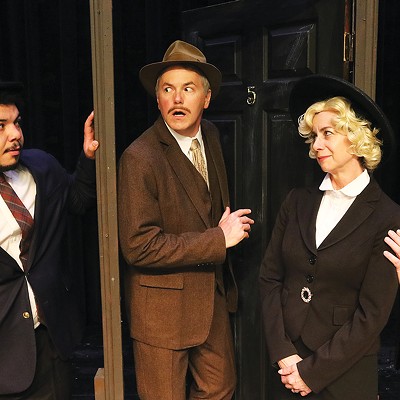Brown biopic
[
{
"name": "Air - MedRect Combo - Inline Content 1",
"component": "11490391",
"insertPoint": "3",
"requiredCountToDisplay": "1",
"parentWrapperClass": "fdn-ads-inline-content-block"
},{
"name": "Air - MedRect Combo - Inline Content 2",
"component": "11490392",
"insertPoint": "7",
"requiredCountToDisplay": "5",
"parentWrapperClass": "fdn-ads-inline-content-block"
},{
"name": "Air - MedRect Combo - Inline Content 3",
"component": "11490393",
"insertPoint": "12",
"requiredCountToDisplay": "9",
"parentWrapperClass": "fdn-ads-inline-content-block"
}
]
I’ve often said that film biographies are a no-win proposition and any director foolhardy enough to take one on is just asking for trouble. Sure to disappoint those who are expecting to see a full examination of the subject’s life and likely to run afoul of those who demand historical accuracy, entries in this genre have the odds stacked against them before the first scene is shoot. That being said, director Tate Taylor’s Get on Up, a film chronicling the life and times of James Brown, is one of the better recent biopics. The production wisely showcases many of the artist’s funk classics and is buoyed throughout by Chadwick Boseman who gives an absolutely electrifying performance as the Godfather of Soul, successfully recreating the singer’s dynamic stage persona, as well as showing his dramatic chops during the scenes depicting the most harrowing times of the performer’s life. It’s a good thing the actor is so engaging. The film’s fractured narrative- approach nearly undercuts his fine effort.
As written by brothers Jez and John-Henry Butterworth, the movie rockets back and forth between events in Brown’s life with the intention of showing how the singer’s memories or songs relate to key moments. It only works some of the time and the result is, at times, inspired but more often muddled. Here we see Brown (Boseman) and his band nearly being shot out of the sky as they fly the not-so-friendly Vietnamese skies on their way to perform for the troops in 1968. Then we’re taken back to his childhood to see him as a young boy, abused by his father (Lennie James), abandoned by his mother (Viola Davis) and brought up by his Aunt Honey (Octavia Spencer), who happens to be a madam in an Augusta, Georgia bordello. As we’re digesting all of this, the scene switches to Brown stealing a suit in 1949, a crime for which he is convicted and sent to jail, where he meets Bobby Byrd (Nelsan Ellis), a gospel singer who will become his main musical collaborator.
And so it goes. We witness Brown’s ascension to the top of the charts, changing the face of rhythm and blues and soul music, creating a sound distinctly his own. It’s obvious that Taylor is trying to shake up the traditional biopic structure in which we march lockstep through the sequential order of key events in the subject’s life, which often leaves viewers with an “Is that all there is?” response. While their effort to make thematic connections across time is an intriguing one, the result is narrative whiplash that sheds little new light on what made Brown the man he was. Equally troubling is Taylor’s decision to have Boseman break the fourth wall and address the audience directly. While this might be an effective approach in some instances, it is done so infrequently here that it comes as a shock when it occurs late in the film. We’ve forgotten that it’s happened before. There’s not a full commitment to this device and it only adds to the fractured nature of the film’s story.
However, once the groove starts moving and Boseman begins dancing, much is forgiven. It’s obvious that the actor was given very little to challenge him in last year’s well-meaning Jackie Robinson biography 42. He’s required to dig deeper emotionally and take more chances physically to bring Brown convincingly to life. There’s a confidence at play that’s electrifying to witness, as if Boseman is walking a tightrope, seeing just how far he can go before making a fatal error. That he’s convincing in singing some of Brown’s greatest hits (all of the concert footage was lip synched) is a testament to how fully he pulls this role off.
Though the film begins with a re-creation of one of the most infamous events in the singer’s life – in which he’s arrested in 1988 for assault with a deadly weapon and attempting to evade arrest – overall Up sugarcoats the numerous allegations and incidents of domestic violence and drug abuse. Yes, there are nods to these issues but there’s never the sense that they were pervasive throughout his life, as other sources have documented. No, really the film is more about the music and its genesis than anything and if it succeeds in turning on someone from this generation to “Get Up Offa That Thing” or “Say it Loud – I’m Black and I’m Proud” then it will have succeeded in furthering Brown’s distinctive musical legacy.
Contact Chuck Koplinski at [email protected].
As written by brothers Jez and John-Henry Butterworth, the movie rockets back and forth between events in Brown’s life with the intention of showing how the singer’s memories or songs relate to key moments. It only works some of the time and the result is, at times, inspired but more often muddled. Here we see Brown (Boseman) and his band nearly being shot out of the sky as they fly the not-so-friendly Vietnamese skies on their way to perform for the troops in 1968. Then we’re taken back to his childhood to see him as a young boy, abused by his father (Lennie James), abandoned by his mother (Viola Davis) and brought up by his Aunt Honey (Octavia Spencer), who happens to be a madam in an Augusta, Georgia bordello. As we’re digesting all of this, the scene switches to Brown stealing a suit in 1949, a crime for which he is convicted and sent to jail, where he meets Bobby Byrd (Nelsan Ellis), a gospel singer who will become his main musical collaborator.
And so it goes. We witness Brown’s ascension to the top of the charts, changing the face of rhythm and blues and soul music, creating a sound distinctly his own. It’s obvious that Taylor is trying to shake up the traditional biopic structure in which we march lockstep through the sequential order of key events in the subject’s life, which often leaves viewers with an “Is that all there is?” response. While their effort to make thematic connections across time is an intriguing one, the result is narrative whiplash that sheds little new light on what made Brown the man he was. Equally troubling is Taylor’s decision to have Boseman break the fourth wall and address the audience directly. While this might be an effective approach in some instances, it is done so infrequently here that it comes as a shock when it occurs late in the film. We’ve forgotten that it’s happened before. There’s not a full commitment to this device and it only adds to the fractured nature of the film’s story.
However, once the groove starts moving and Boseman begins dancing, much is forgiven. It’s obvious that the actor was given very little to challenge him in last year’s well-meaning Jackie Robinson biography 42. He’s required to dig deeper emotionally and take more chances physically to bring Brown convincingly to life. There’s a confidence at play that’s electrifying to witness, as if Boseman is walking a tightrope, seeing just how far he can go before making a fatal error. That he’s convincing in singing some of Brown’s greatest hits (all of the concert footage was lip synched) is a testament to how fully he pulls this role off.
Though the film begins with a re-creation of one of the most infamous events in the singer’s life – in which he’s arrested in 1988 for assault with a deadly weapon and attempting to evade arrest – overall Up sugarcoats the numerous allegations and incidents of domestic violence and drug abuse. Yes, there are nods to these issues but there’s never the sense that they were pervasive throughout his life, as other sources have documented. No, really the film is more about the music and its genesis than anything and if it succeeds in turning on someone from this generation to “Get Up Offa That Thing” or “Say it Loud – I’m Black and I’m Proud” then it will have succeeded in furthering Brown’s distinctive musical legacy.
Contact Chuck Koplinski at [email protected].
Illinois Times has provided readers with independent journalism for almost 50 years, from news and politics to arts and culture.
Your support will help cover the costs of editorial content published each week. Without local news organizations, we would be less informed about the issues that affect our community..
Got something to say?
Send a letter to the editor and we'll publish your feedback in print!





















